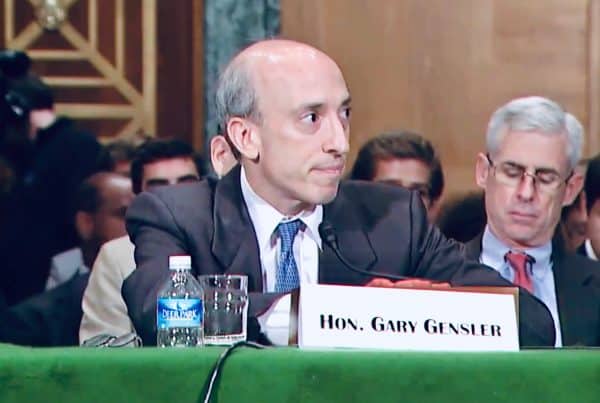Last month, the SEC Small Business Capital Formation Advisory Committee held a virtual meeting to discuss the definition of an Accredited Investor. For anyone viewing the meeting, it was clear that Committee members would like to make it easier for individuals to qualify as Accredited, but will the Commission listen?
The definition of an Accredited Investor is a key qualification for access to private securities offerings. Most importantly Reg D, both 506b and 506c (the crowdfunding iteration). This security exemption is the most popular vehicle for promising, private firms to raise needed growth capital. The market is huge at over $1 trillion annually and is a vital capital formation path generating important economic activity that fuels innovation and prosperity. Just about every single successful tech firm in the US has raised money from investors using Reg D.
In brief, an Accredited Investor is an individual who earns over $200,000 a year or has a net worth of more than $1 million – not counting a primary residence. If married, the income hurdle jumps to $300,000. A more detailed definition is available below in a deck created by the SEC.
This is not the first time the SBCFAC Committee addressed the definition of an Accredited Investor. In 2019, the Committee posted recommendations for the Commission as follows:
a. Leave the current financial thresholds in place, subject to possibly adjusting such thresholds downwards for certain regions of the country.
b. Going forward, index the financial thresholds for inflation on [a] periodic basis.
c. Revise the definition to allow individuals to qualify as accredited investors based on measures of sophistication. In doing so, the Commission should create bright-line rules for qualifying as an accredited investor by sophistication, which could include professional credentials, work experience, education, and/or a sophistication test.
During the last administration in 2020, the Commission left the wealth metrics in place but opened the door, only slightly, to allow certain individuals to be qualified as Accredited including any individual holding a Series 7, 65, or 82 licenses or a “knowledgeable employee.” Clearly, the Commission at that time could have broadened the sophistication qualification to allow more people to access Reg D offerings but that was then, this is now.
Once again, the definition is atop the SEC’s regulatory agenda as established by SEC Chairman Gary Gensler. To quote the agenda:
“The Division is considering recommending that the Commission seek public comment on ways to further update the Commission’s rules related to exempt offerings to more effectively promote investor protection, including updating the financial thresholds in the accredited investor definition, amendments to Rule 701, and amendments related to the integration framework for registered and exempt offerings.”
The inference is, of course, that the Commission wants to set a higher bar for the definition with the aspiration of furthering investor protection. There is no data, as far as we are aware, that raising the threshold will accomplish this objective
During the SBCFAC Committee meeting, participants expressed their opinion that the wealth metrics should remain the same while adjustments should be made to make access more equitable to the entire country.
Several members shared their opinion that earning a $200,000 salary in New York City or San Francisco – is far different than the same salary in flyover country. Cost of living matters and wealth is measured differently depending on the state or city. While $200,000 in Columbus, Ohio or Dubuque, Iowa will get you quite far, in Manhattan you are probably struggling to make ends meet.
Furthermore, some Committee members indicated that raising wealth thresholds on the definition would further exacerbate the growing wealth gap – harming underserved demographics including minorities.
At the same time, early-stage firms need access to capital to grow. Removing the ability of any percentage of investors will probably undermine the ability of these firms to survive and perhaps thrive. One person noted that 70% of venture-funded companies received funding from accredited investors first and reducing the pool would impact the number of companies able to get to venture capital.
An attorney on the Committee stated that the SEC is not in the business of loss mitigation and it is more about understanding loss. “Fraud happens from a completely different place from the definition. We need to decouple this from the definition.”
Another aptly pointed out that non-accredited investors can already put their money into crypto, speculate on real estate, meme stocks – not to mention a trip to Vegas. Should the SEC be pushing people into riskier assets?
“… narrowing the definition of an accredited investor is not the answer,” stated one Committee member.
While the definition is most frequently aligned with Reg D, the metric will also impact Reg CF and Reg A+ with unknown consequences. Beginning last year, Reg CF issuers were allowed to raise unlimited amounts from accredited investors when before limits were applied.
Earlier this month, the SBCFAC Committee published their new recommendations that deviate slightly from the prior recommendation. The Committee advised the Commission:
- Do not increase the current financial thresholds for individual investors to qualify as accredited.
- Going forward, consider indexing the financial thresholds for inflation on a periodic basis.
- Given the imperfect proxy that financial thresholds provide for measuring investor sophistication, provide alternative methods for investors to qualify as sophisticated, which could include investment experience, knowledge gained through work experience or membership in associations, education credentials, additional professional certifications, or tests to demonstrate sophistication
- the Committee also recommends that the Commission consider creating a new exemption for local and/or micro-investments that would not be limited to accredited investors
At the opening of the SBCFAC meeting, Commissioner Hester Peirce aptly stated:
“If we’re going to increase participation in our capital markets by a broader group of investors and founders, we need to move off measuring the ability to participate in private markets by wealth and income.”
She added that it should be an individual’s choice, and not the federal government’s decision, as to how you spend your money. Wise words.
The obvious answer to the accredited investor definition is clearly sophistication. We all know individuals that have more money than financial acumen. Parents of a business school student probably would do well to listen to their offspring when making investment decisions. But the current Commission is far more political than prior Administrations and may not let facts get in the way of a predestined decision. So will the Commission embrace the recommendations of the Committee or simply ignore their collective experience? If wealth metrics are increased minus a simple sophistication qualification, we all lose.



